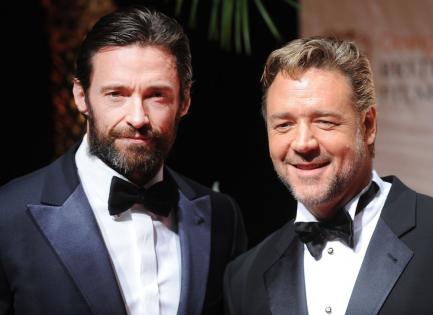The big-screen adaptation of Les Miserables is a collage of show-stopping moments, breathlessly weaved together by the wrought emotion of songs that have been wowing stage audiences for decades.
It took just three days of shooting, during Hugh Jackman's thunderous soliloquy as the criminal Jean Valjean, for director Tom Hooper to realise he could wrestle sheer emotion from actors as well as serve the musical's celebrated score.
"There's a point where a tear runs down Hugh's cheek, then a tear rolls down another and he's still hitting all the notes," Hooper says.
"It was a revelation that you can go to an intense place and still carry the melody - and was also the moment I realised that Hugh had found a way of reinventing the stage show for the close up."
While there is a flash of the melodramatic in Hooper's grandiose, gritty treatment, his film version will no doubt be remembered for its spine-tingling performances.
Jackman is already tipped for award glory, with Golden Globe and Screen Actors Guild nods almost certainly preceding an Oscar nomination, but Russell Crowe as Valjean's nemesis Javert and Anne Hathaway as the doomed Fantine are equally deserving of plaudits.
Acted out almost entirely in song, Les Miserables flits from intense close-ups where you practically live in the actors' eyes, to epic battle scenes fitting of the film's setting in Pre-Revolutionary France.
Hooper acknowledges the irony of Victor Hugo's novel being re-enacted by Aussies, Brits and Americans but there is no coincidence the British director, who cast Australians Geoffrey Rush and Guy Pearce in his Oscar-winning The King's Speech, returned to Antipodean actors.
"You've got to remember that all the actors are playing Frenchmen and in some ways the Australian actors are freer in that capacity," he says.
"I remember Russell saying that he didn't want to play Javert like an uptight Englishman but instead wanted to bring the passion of the French to the role."
Closely honouring the musical, Les Miserables centres around the story of Jean Valjean, a prisoner who breaks his parole and attempts to build a new life determined to do the right thing.
He adopts the street orphan Cosette (Amanda Seyfried) after witnessing the death of her mother but his efforts to conform are thwarted by the persistent policeman Javert, who once detained him.
With the Parisian rebellion unfolding and raising the stakes, the players are thrown into a larger conflict and Valjean is forced to decide what is more important - his own freedom or the happiness of his adopted daughter.
The musical's plot dynamics are captured skillfully in Hooper's vision and in some way the film tells the story in an easier form, although the idea to amplify the epic is by no means new.
Producer Cameron Mackintosh was keen on an adaptation almost as soon as Les Miserables hit the West End in 1985 but his plan ran flat when it came to finding film actors who could sing.
While musical theatre was then a relatively new phenomena, today's cast of actors were brought up treading the boards to song. Hathaway stepped into the role her mother once played in Fantine, while Jackman started his career in the musical Beauty & The Beast and Crowe in Blood Brothers.
"They've all been part of it so they're equipped and at ease with telling a story through music," says Mackintosh.
"Having the confidence to hit all the right notes meant they were also able to reinterpret the text which has allowed Tom to unleash all those qualities which make the film so cinematic."
With a film always in mind, Mackintosh, who also produced the original, earmarked Jackman and Crowe early on in his plans but originally pencilled them into opposite roles, something Hooper reversed as soon as he was hired as director.
Hooper says their personalities and acting capabilities virtually cast themselves.
"The thing that marks Hugh out is he has extraordinary kindness which runs through what Valjean is all about," Hooper says.
"Russell meanwhile is very good at playing characters in conflict and his character is one going through extreme dissonance."
Although the Australian pair dominate screen time, Hathaway's haunting delivery of I Dreamed A Dream is likely to be the moment etched into movie history.
Deserving of an Oscar itself, Hathaway cut off her hair for the unedited three-minute scene as a young mother in the pits of despair.
"It was an extraordinary day and she had to go to a very dark place in herself to do that," Hooper remembers.
"Whenever I watch it now I admire the total lack of self indulgence in that performance because she's gone somewhere so bleak.
"She was visibly in pain and I was pleased when it was done so she could close that door."
Love or loathe it, Les Miserables leaves a lasting impression. While a criticism frequently levelled at movie musicals is the obvious lip synch to pre-recorded songs, Hooper has ensured through every note that the performances are as real as humanly possible.
"I didn't want to ask audiences to forgive us singing to playback especially when I was trying to create such a visceral connection between the audience and the actors," Hooper says.
"Also it was about giving power back to the actors because great acting is all about being in the moment. They all rose to the challenge."
















__small.png)










